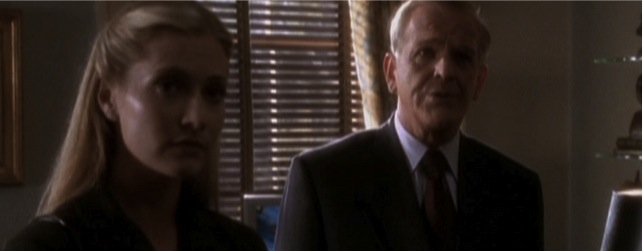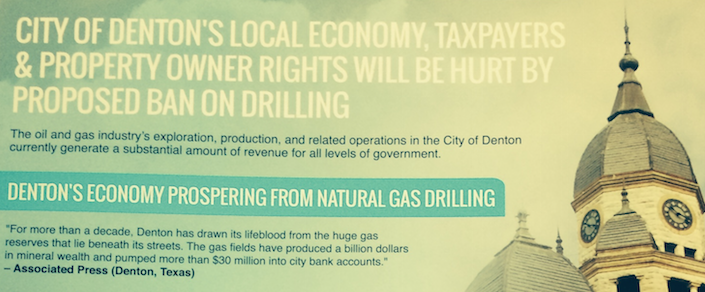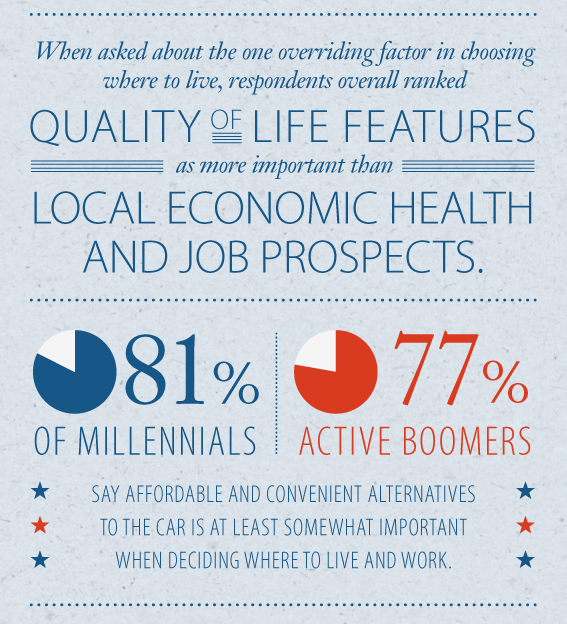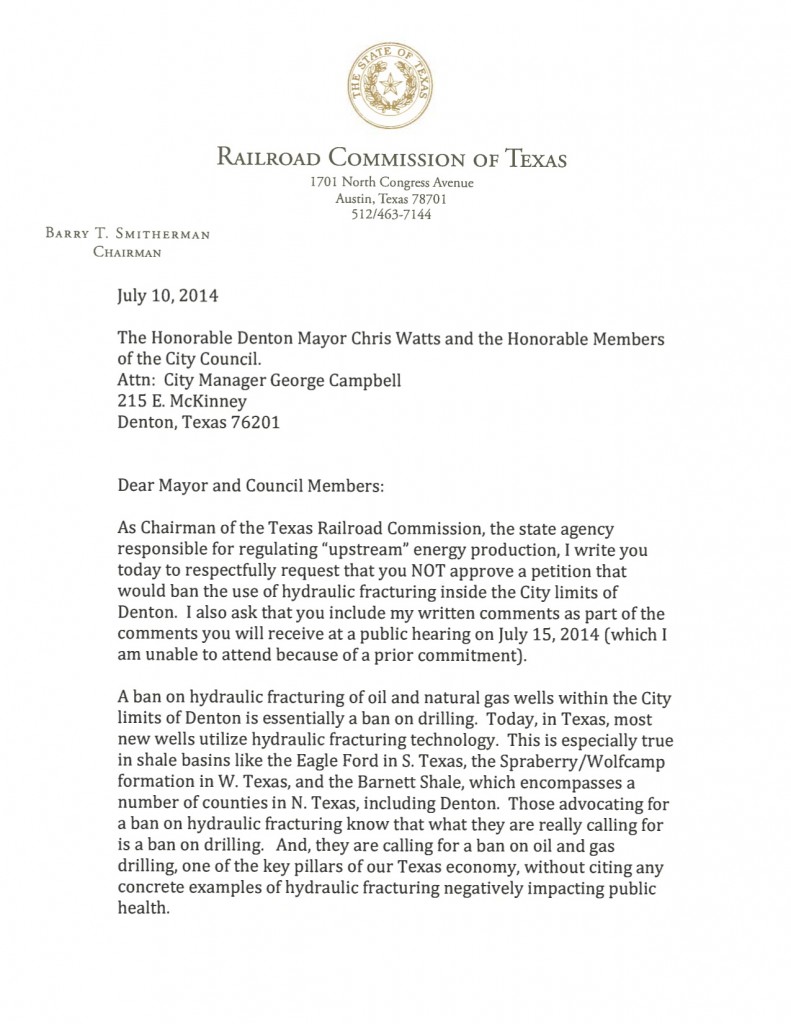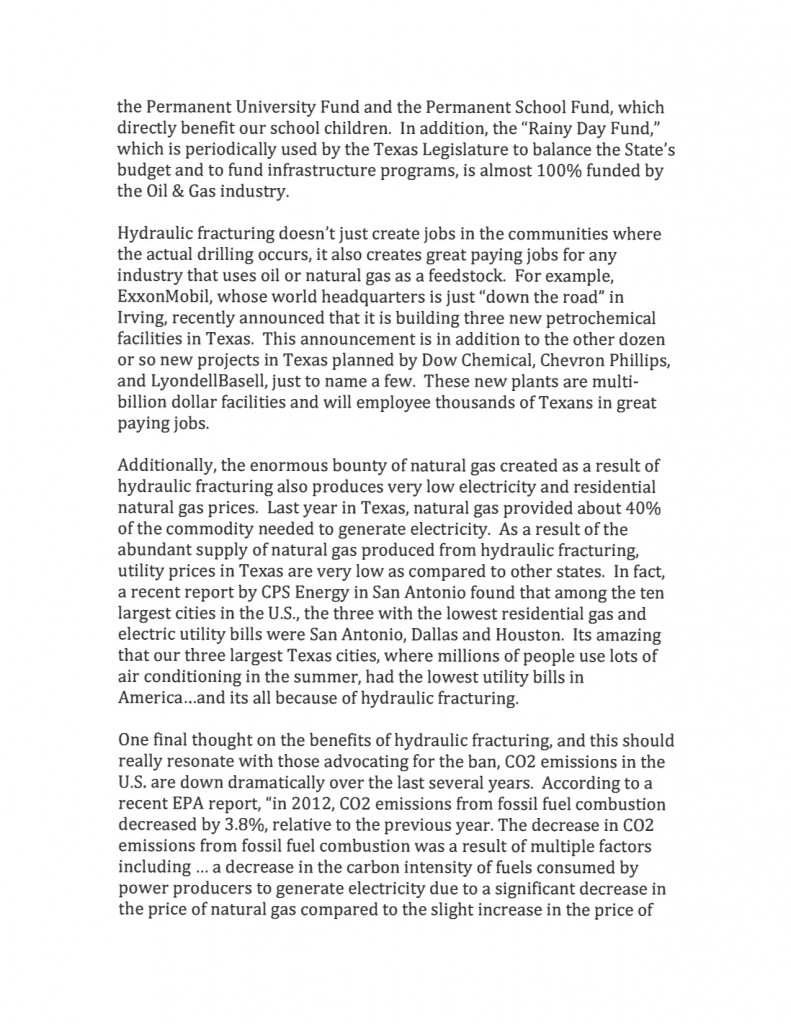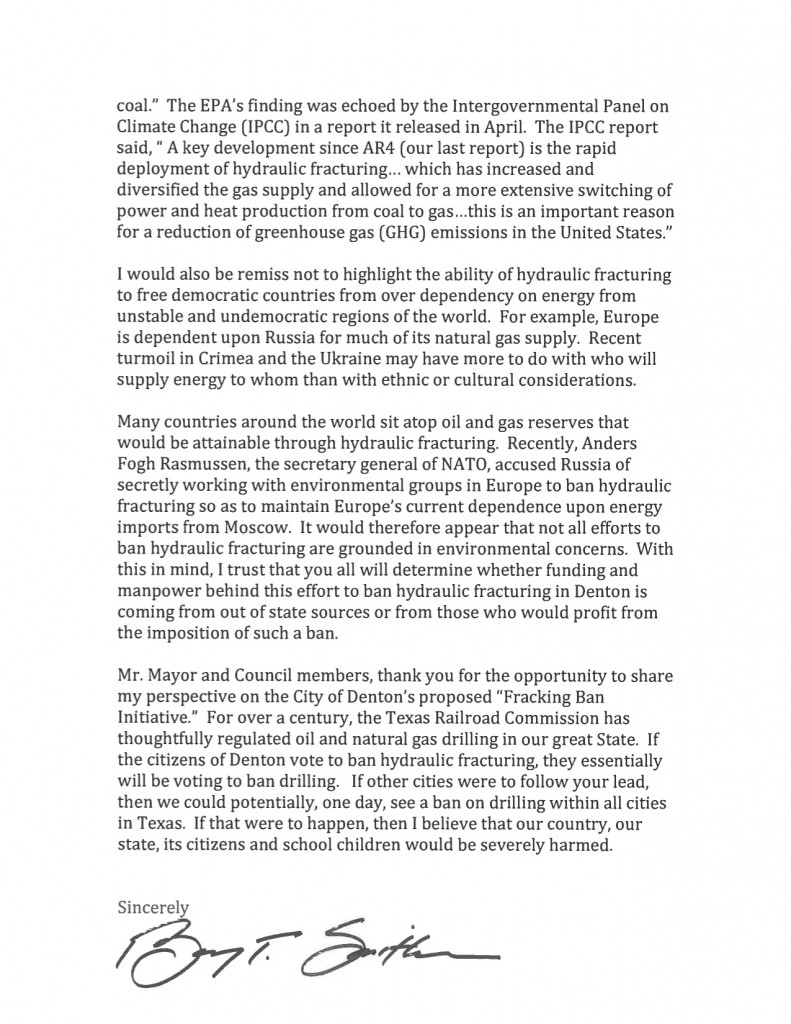Denton PD Releases Internal Affairs Investigation of Excessive Force
The Denton Police Department released this news release today regarding an unfortunate incident many of you have inquired about.
Public trust in our law enforcement community is essential in a democracy. I am proud of our police department for acting swiftly and decisively to respond, investigate, and ultimately hold accountable those who acted unjustly and inappropriately.
On Fracking, Boycotts, and Democracy: A Lesson From Ainsley Hayes
After less than 2 hours of sleep following last Tuesday’s unforgettable council meeting, I got my kids in the car and hopped on a plane to Cleveland to visit my family. Still there, but just now getting to the social media aftermath. And it’s ugly.
I understand why people are frustrated. But calling some of my colleagues spineless, cowards, corrupt, and bought by the oil industry because you disagreed with their vote is unfortunate. A vote, by the way, that I find wholly reasonable and defensible – even though, at the end of the night I disagreed. And now there are calls for boycotts of businesses and recall elections?
Why do we insist on importing such ways of reacting and talking from the poisonous political rhetoric of DC?
Disagree. Get mad. Be passionate. But channel that into democratic civic virtues: debate, form an argument, sit down with your council member, write a letter, vote against someone, run for office, or maybe even dare to learn from someone you vehemently disagree with.
But the thought that we only want to do commerce and hang around in the same businesses with those who hold the same political opinions as us appears to me to be the furthest thing from the democratic spirit. In fact, it’s the most dangerous thing to a vibrant democracy.
I have the utmost respect for my council colleagues, even and especially when I wholly disagree with them. They work hard, they love Denton, and we all found ourselves faced with a difficult decision on an enormously complex issue with far-reaching consequences on either side.
I warned of the problem of political fundamentalism in this post just before Thanksgiving. I continue to think its presence in a city is much more toxic than a 100 gas wells.
I leave you with a scene from the second season of West Wing. Ainsley Hayes, a Republican talking head, was just invited to join the Democratic Bartlett White House, in part because of her stunning performance dressing down Senior White House Advisor Sam Seaborn on a recent cable talk show. After spending a day inside the White House with an administration that she was earlier hired to criticize at every turn, she returned to her Republican friends who were eager to hear about just how bad her political enemies were. Check out her response and consider our’s…
Fracking and Denton’s Economy: A Quick Response to the Perryman Study
The oil and gas industry is well funded and they are certainly pros when it comes to messaging, media relations, and politics. Which is why they perfectly timed the release of an economic study on the impacts of a proposed fracking ban just when the local, regional, and national media frenzy began. They know that means there won’t be enough time for anyone talking about this issue to digest and properly analyze their data, yet they’ll get every reporter leading off with their claims taken right off the front page of their 69 page report.
The report claims that Denton will lose millions if this ban goes through. Whatever you think about the wisdom of adopting a fracking ban in Denton, let’s make sure we are all aware of the facts here.
To begin with, it should be notable that the study was funded my the oil and gas industry and commissioned by the Fort Worth Chamber of Commerce. If it is true, as the report claims, that $251.4 million in gross product and 2077 person-years of employment would result from the continuation of Denton fracking over the next 10 years, we know that the vast majority of that money and the jobs will go to OUT OF TOWN companies and their workers. Hence, the concern of the Fort Worth Chamber – they are home to a bunch of major oil and gas companies as the map below shows.
Here are some economic facts that show the real economic impact of natural gas operations in Denton:
-
Out of $6,979,224,274 in total property values across the city, only $81,463,434 come from minerals – that’s only 1.17%.
-
From that, the city gets only $561,894 in property tax revenue. That amounts to only 1.1% of all our property tax revenue and only 0.5% of all the revenue going into our General Fund.
-
Realize that Mineral Property Values are assessed regardless of any real plans to develop them. It’s likely that this revenue would continue with or without a ban on fracking.
-
Only 0.27% of Denton jobs come from oil and gas operations. And these numbers have gone down 2.2% between 2012 and 2013.
-
The Airport Gas Fund gets about $900,000 a year in royalties. That money comes from existing wells that are in production and would continue to produce with or without a ban on fracking in Denton.
-
Likewise, the Park Gas Well Fund gets about $150,000 a year in royalties. That money comes from existing wells that are in production and would continue to produce with or without a ban on fracking in Denton.
Could a Frack-Free Denton Result in an Economic Boom?
Citizens in Denton are attempting to make our city the first city in the state of Texas to ban fracking. It’s everything I would expect to come out of our citizenry. There’s an ambition to our people that is easily overlooked, but once discovered, explains much about our local culture.
Local statesman-philosopher-theologian-technologist and cultural critic Dave Sims said this about our local music scene in a celebrated 2008 New York Times piece on our city:
There’s this combination of artistic fervor and small town naïveté. Artists here don’t know they’re not supposed to be Bob Dylan so when they start a band, they shoot for the moon.”
It’s the best sushi in the region in an nondescript location on Elm Street without barely a sign out front. It’s having the largest community garden in the nation. It’s figuring out how to get the local NPR station to always include ONLY the name Denton alongside Dallas and Fort Worth back when our population was a quarter of the size we are now. It’s the vision of a Shaun at a place like Midway Mart. It’s crazy ideas like the collaborative nonprofit vision of Serve Denton or Mentor Denton where we think getting a quarter of our adult population to mentor our 10,000 at-risk kids is possible. It’s really believing that we are just a few years away from overtaking Austin and every other city as the top spot for high tech and startups. It’s getting a commuter train to a city our size in the most car-centric part of the nation. It’s leading the nation with 40% wind power sustaining our energy needs.
It’s how Denton does it.
DENTON’S ECONOMY PROSPERING FROM NATURAL GAS DRILLING?
As the industry-friendly outsiders begin to pour tens of thousands of dollars into “educating” our citizens of the economic benefits of fracking in our community, it is important to be clear on this subject: A ban on fracking in Denton will have no perceivable impact on our local economy.
The money to be made from fracking in Denton has largely already been made, as evidence by the hundreds of existing wells, many of which were drilled nearly a decade ago, throughout the city. We are home to no major oil and gas operators. Our local government and schools are not depending on revenues from gas to fund our services. And according to recent economic demographic data for the city (see below), jobs relating to the oil and gas industry make up just 0.27% of our local workforce and has even seen a 2.02% decrease between 2012 and 2013.
Local fracking could stop tomorrow and our economy would hardly notice. The economic concern relating to the proposed ban really boils down to the cost of what is likely to be a lengthy and expensive legal battle from operators, mineral rights owners, industry groups, and perhaps even the state of Texas. And given the unchartered waters this proposed ban would take us on, our ability to succeed remains questionable. It is not unreasonable for citizens to question the wisdom of spending millions on legal challenges that we could very well lose.
AN UNLIKELY ECONOMIC ANALYSIS OF A DENTON FRACKING BAN
We’ve determined that the only real threat to our local economy of the proposed fracking ban is the relatively temporary, though likely high cost of an extended legal battle defending it. Most people will judge the wisdom of such an economic risk on the likelihood of overcoming those legal challenges. In other words, spending money on a protracted legal fight defending the proposed ordinance is justified or unjustified relative to the perceived likelihood of winning that legal fight. This isn’t an unreasonable economic assessment, but it seems lacking.
What both sides in this debate fail to account for is the potential economic boom that could be created by a frack-free Denton.
Given the rhetoric of late of shoe-less school children and global Russian domination, it might be difficult to get our minds wrapped around a different way of thinking about the economics of fracking in the 21st century city. The entire argument likely turns on the preferences of millennials.
The Atlantic City Lab recently released an article entitled, “What Millenials Want – And Why Cities Are Right to Pay Them So Much Attention,” where two studies were cited indicating that this future generation places a high priority on sustainable living in sustainable cities. A Pew Study on US Energy Policy says that 73% of those 30 and younger, and 61% of those 30 to 49, say it is more important to develop alternative energy sources. The pertinent question for us is this: How does a city like Denton retain and attract the best and brightest of this generation? As Governing Magazine puts it,
For the foreseeable future, the so-called millennials (currently ages 18-30) will drive both the housing market and the fast-growing innovation economy. It’s a huge cohort of about 70 million people. [T]hey are gravitating toward a select group of metros and small cities… So if you’re not one of the hip places today, you have only a few years — the length of one real estate cycle and the time horizon for planning an infrastructure project — to become hip enough to keep your kids and attract others.”
Like it or not, the economically powerful cities of the 21st century will be those that figure out how to be attractive to this generation.
While the oil and gas industry makes up a mere 0.27% of our local jobs, we have the potential to leverage a boom of another sort – Denton is the 6th best high-tech hot-spot in the nation. Smart cities are paying attention to the studies and are realizing that investing in sustainability, walkable/bikable development and infrastructure, cultural amenities, and vibrant urban cores is the way to retain and attract a talented workforce and the companies who need them. As an example, cities like Chicago are racing to be the most bikable cities in the nation – all with the goal to attract high tech industry.
Denton already has so much to situate us as a major player in the 21st century innovation economy. But the reputation of a town that allows fracking within 200 feet of established neighborhoods combined with some of the worst air quality in the nation, actually serves to overshadow our more attractive traits and results in an unfortunate black eye on otherwise ambitious and nation-leading sustainability chops. What are we doing to counter this?
If Denton were to lead the state as the first Texas city to ban fracking, combined with our existing commitment to sustainable innovation, and reputation as world-famous cultural center, our city would quite instantly be seen as the most progressive city in Texas, if not the entire region.
And here’s the kicker – this reputation would stick whether or not the fracking ban survives legal scrutiny and statutory changes. We will always be known as the city that sought to stand up to the energy policies of the 20th century in order to lead the nation to a more sustainable future in the 21st century. What’s the potential of that worth to us?
In a nation where smart cities are falling over themselves to attract the best and brightest of the millennial generation and reap the economic development benefits that follow, there just might be a case that a few million today to fight for a frack-free Denton will position our city for a sustainable, long-term economic boom of another kind.
POSTSCRIPT – LET’S NOT LOSE SIGHT OF THE PROBLEM
Since I was elected to the city council in 2011, I’ve tended to approach the fracking issue in a problems/solutions context. How can one particular tool or set of tools help us solve a particular set of problems? Once those problems are solved, let’s reassess the remaining problems and and figure out how to apply or acquire the necessary tools to those – and so on.
As I conclude this article, I have to be clear that it is in that spirit that I have approached the proposed fracking ban in Denton. There are significant problems left to be solved among our fracking landscape. Most notably the problem of older, existing wells, approved under earlier regulations and seemingly grandfathered by old plats. I wrote about this problem extensively. I referenced it immediately after we passed our January 2013 gas drilling ordinance overhaul. And then I spelled the problem out in greater detail in November 2013 at the outset of representing the council on lengthy and extensive negotiations with EagleRidge Energy (again, in an effort to solve a lingering problem that ordinances seemed unable to solve).
In that light, I continue to worry that whatever the outcome of a proposed ban on fracking (whether by council vote or city-wide election), we will find ourselves back in the situation we are in today 8 months or so down the road: an ordinance that is only effective to regulate completely new drilling operations and a whole bunch of existing wells in our fastest growing part of the city that can be reactivated at any time, with a potentially unlimited number of wells for perpetuity, regardless of their proximity to homes, schools, parks, and hospitals. Once we get beyond the media attention, the likely expensive and extensive legal battle with operators, mineral rights owners, and the state of Texas, where will we be? Is the proposed fracking ban the correct tool and, perhaps more importantly, can that tool be sustained?
Beyond this economic discussion (which I float here for further discussion), we need to continue to focus on how to solve these problems should a ban either fail a city-wide vote, or pass and get overturned through legal challenges.
Please comment here, send me an email at kevin.roden@cityofdenton.com, or call me at 940-206-5239 with any comments, questions, concerns.
Railroad Commission Chair Chimes in on Denton Frack Ban. And I Respond.
A growing number of voices are weighing in on the fracking ban petition ordinance the city council will vote on during next Tuesday’s council meeting. Tonight the City Council received a letter from Barry Smitherman, the Chair of the Texas Railroad Commission, urging the council to reject the proposed fracking ban, calling the attempt to do so “extremely misguided.” A copy of his letter is provided below.
I’m not intending to use this post to speak one way or another about the wisdom of a Denton fracking ban, but I do have a candid response to Chairman Smitherman:
Where have you been? The Denton community has been struggling with very serious issues directly resulting from policies and regulations your Commission is charged with enforcing. Where were you when we struggled, unsuccessfully, to find a way to prevent a drilling operator from fracking 200 feet from the back porch of several houses in an established neighborhood? When our community has experienced blowouts, spills, and significant air quality concerns stemming from the very industry you are supposed to be regulating, where have you been?
You’ve been silent, absent, seemingly unconcerned, and clearly regulatorily ineffective.
Yet a group of concerned citizens, faced with unacceptably close drilling operations right in their backyards and frustrated with an obvious lack of regulation, take matters into their own hands and only then do you enter into the discussion – and only to advocate a squashing of their efforts. You offer no policy suggestions, no empathy, and no sign that you understand the situation we find ourselves in here in Denton.
On Tuesday night, I fully expect to face a crowd of frustrated and exasperated citizens, some of whom may have harsh words to say about my leadership (or lack thereof) on this issue. I will gladly listen to a thousand citizens yelling at me in attempts to make their city better and healthier over the letters of out-of-touch Austin bureaucrats.
When you are ready to help and suggest solutions to these issues, I’m all ears. But I have no interest in an advocacy letter defending the very industry and weak regulations that have created these problems in the first place.

